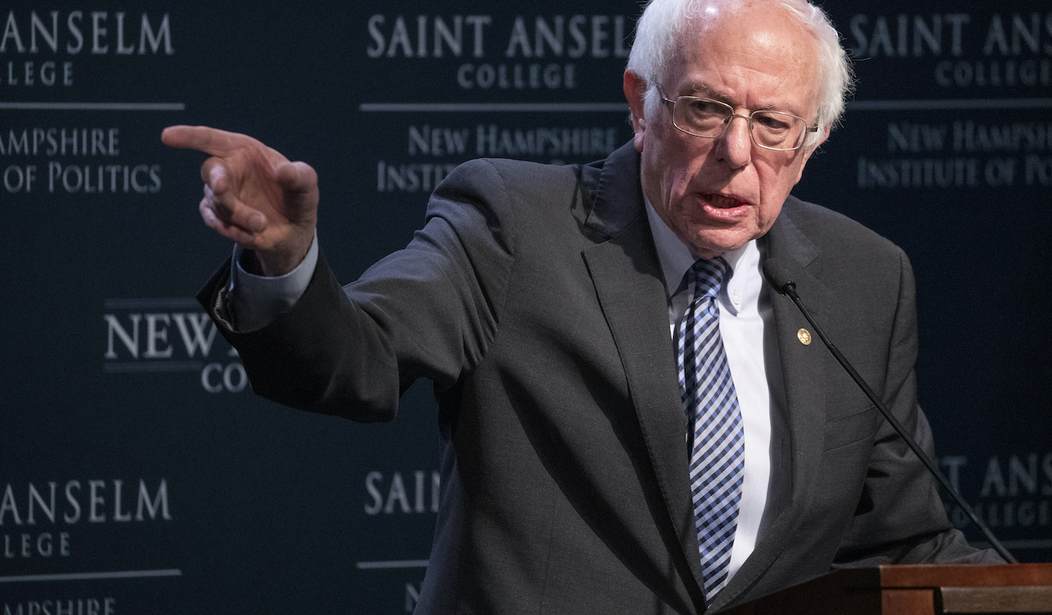You hear it said and see it written that Bernie Sanders will be another George McGovern -- that is, a left-wing nominee who lost a presidential election in a landslide.
I'm here to tell you that's wrong. Because the times are different. And because Sen. Sanders is, or ought to be, a scarier candidate and a further departure from historic American norms than George McGovern ever was.
I speak perhaps from a position of prejudice. I supported George McGovern in 1972, in the primaries and in the general election. And though my views on issues have changed since then -- as have issues themselves -- I still find things to admire in my onetime candidate.
And evidently, so far as my family members and McGovern himself were able to figure, we were neighbors once, living down the street from each other in Diamond Lake, Illinois, in 1947. McGovern was then a divinity student at Northwestern University and a practice minister, and my father was an Army surgeon at nearby Fort Sheridan.
But back to the present. If Sanders becomes the nominee of the Democratic Party, there is just about zero chance that he will lose by anything like the 61% to 38% popular vote and the 521-17 Electoral College margin by which McGovern lost to Richard Nixon 48 years ago. That's even if his free college/free health care/free Ben & Jerry's ice cream platform proves as unpopular as McGovern's $1,000-a-year so-called Demogrant. And even if Sanders' anti-Israel, soft-on-Cuba foreign policy views prove as irrelevant as McGovern's opposition to a Vietnam war that was clearly winding up toward an end.
Recommended
That's because the electorates are different. The large majority of voters in 1972 had living memories of the Great Depression of the 1930s and World War II in the 1940s. (The one segment that didn't, baby boomers, voted almost 50% for McGovern.)
Voters who remembered the depression and the war were ready to cross party line and cast landslide votes for incumbent presidents who appeared to produce peace and prosperity, regardless of party. They voted 57% for Dwight Eisenhower in 1956, 61% for Lyndon Johnson in 1964, 61% for Richard Nixon in 1972and 59% for Ronald Reagan in 1984.
It didn't matter much who the opponent was. Barry Goldwater in 1964, like McGovern in 1972, was labeled an extremist. But polling suggested their intraparty rivals would not have run much better. And Adlai Stevenson in 1956 and Walter Mondale in 1984 were never considered extremists.
Today you have to be 80 years old to remember the war and 85 to remember the Depression. For most of the last 30 years, the two parties have been evenly balanced, and voters have been voting straight tickets in election after election. No presidential candidate in this century has received less than 46% or more than 53% of the popular vote.
Moreover, the personal character and style of President Donald Trump have made 40-some percent of voters vitriolically opposed to him, ready to support his removal from office over something as trivial as his policy toward Ukraine.
So it's really hard to see Bernie Sanders losing by what is considered a landslide margin. Indeed, it's readily possible to see how Sanders, currently leading Trump 50% to 45% in the RealClearPolitics average of recent polls, might win.
Which is not to say that Sanders occupies the same place in the American political spectrum as McGovern. McGovern was not a socialist but a conventional liberal Democrat of his day on most issues, distinguished by his early opposition to the war in Vietnam.
That opposition came not from Sanders-like admiration of the communists or anti-American animus but from a visceral recoil against the horrors of war. McGovern was the son of a Methodist minister who studied for the ministry himself, but in between, he served as a bomber pilot -- famously hazardous duty -- in World War II.
His service as chairman of a commission rewriting the Democrats' nomination process rules helped him maneuver to win the Democratic nomination just as the Nixon administration was preparing to negotiate a settlement with the communists and withdraw all U.S. troops from Vietnam. That outcome was sealed in June, when after intensive U.S. bombing of Hanoi, General Secretary Leonid Brezhnev headed to a summit meeting with Richard Nixon.
McGovern's main issue was suddenly rendered moot. And just at that moment, in mid-June, operatives employed by the Nixon campaign broke into the Democratic headquarters at Watergate. Events of a single month doomed both McGovern's campaign and Nixon's presidency.
Anyway, McGovern was McGovern and is now part of history. Bernie Sanders is something else.
Michael Barone is a senior political analyst for the Washington Examiner, resident fellow at the American Enterprise Institute and longtime co-author of The Almanac of American Politics.

























Join the conversation as a VIP Member